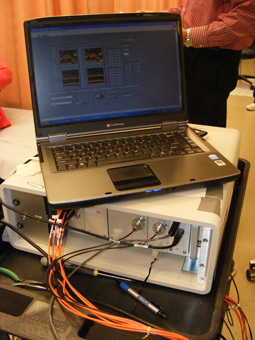 Launched in 1997, the Drexel School of Biomedical Engineering is a relatively young division for the West Philadelphia institution. But like many young up-and-comers, this school’s wisdom belies its age. In a 2006 address to prospective students, Director Banu Onaral promised to lead student thinking toward the future of biomedical innovation, combining engineering and technology with traditional medical practices to dig out new niche markets.
Launched in 1997, the Drexel School of Biomedical Engineering is a relatively young division for the West Philadelphia institution. But like many young up-and-comers, this school’s wisdom belies its age. In a 2006 address to prospective students, Director Banu Onaral promised to lead student thinking toward the future of biomedical innovation, combining engineering and technology with traditional medical practices to dig out new niche markets.
Since this 2006 progress report, the school has made great strides in the field of biomedical optics research. From brain-sensing lie detectors to xray microscope cameras capable of taking high resolution pictures of living cells in real time, optics innovations allow doctors to view the human body in exciting new ways. The most recent project allows doctors to determine the depth and seriousness of wounds through sensors. Diseases like diabetes can create ulcerous wounds that are often misinterpreted. Drexel’s sensor technology hopes to change that as the product moves to the commercialization stage.
“These are open wounds but what you see on the surface is not necessarily indicative of what is underneath,” says Assistant Professor Elisabeth Papazoglou, “What we have is a small Teflon probe with a sensor and a light so you don’t have to worry about contaminating the wound. And once we have several readings, we can determine if there is something more serious going on.”
In 2009, the University City Science Center selected the near-infrared wound monitor to receive a $200,000 award from their QED grant program. With this funding, Papazoglou and her team have licensed their technology to Emunamedica, a wound management company out of Hollywood, FL. With this first license, Papazoglou’s team hopes to bring a new weapon to the fight against wound disease.
“The more people who use this device and have data, the more people see that it’s good, it’s fast, nurses can use it,” says Papazoglou. “You need that word of mouth to prove that it’s not just us.”
Source: Elisabeth Papazoglou, Drexel University
Writer: John Steele
For more of Greater Philadelphia’s latest and greatest, sign up here to receive Flying Kite every week for free in your inbox.